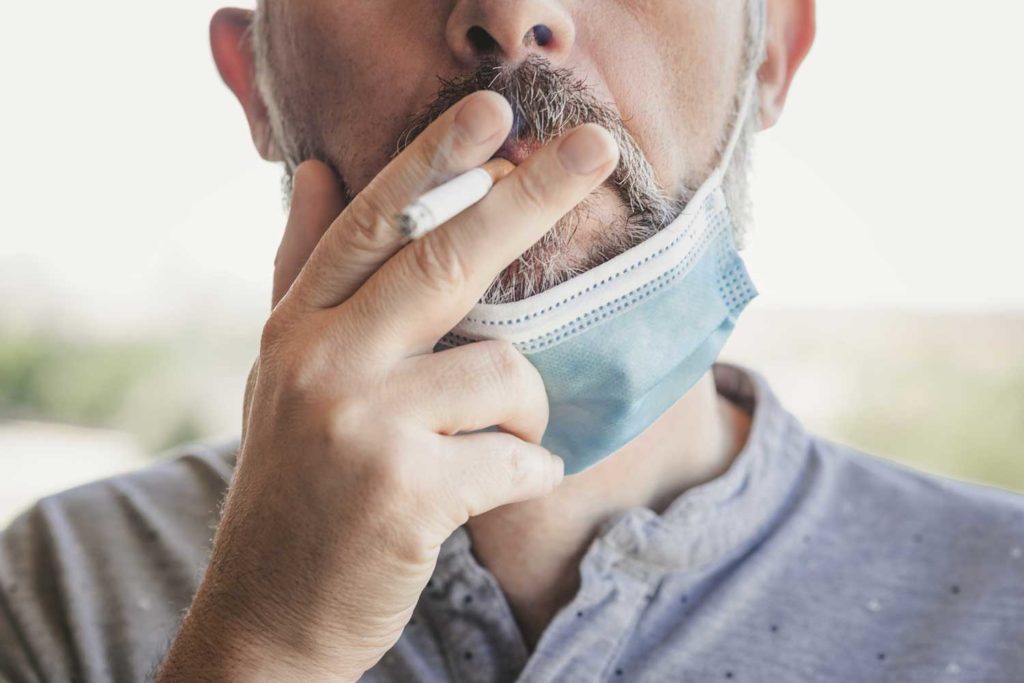
The comparison made between tobacco deaths and Covid-19 deaths does not hold water.
By George Gay
Most of us compare things on a regular basis and make choices between them, either as part of practical or theoretical exercises. For instance, a group of friends might be having dinner when one of them asks whether each of her friends prefers bitter, salty, sour, sweet or umami tastes. Initially, one replies that she prefers sweet while another opts for sour. But after a while, the exercise becomes more involved as the diners think more deeply about the question. Somebody asks whether the person who posed the question was referring to the tastes associated with solid food or drinks while another asks whether the food or beverages were being taken as part of breakfast, lunch, dinner or a snack. And yet another asks whether the food and beverages were being consumed and the tastes experienced outdoors on a warm day or indoors on a cold one, as part of a celebration or in an effort to cheer oneself up …
At this point, the hostess removes all the sharp implements from the table and grumpily guides the discussion toward something less controversial, such as politics or religion.
It is true that such questioning can be annoying, but it is important to understand something of the context when a comparison is being made. For too long, in my view, large sections of the tobacco and tobacco control industries have blindly accepted the idea that tobacco prohibition wouldn’t work anywhere in the 21st century because liquor prohibition didn’t work in the U.S. in the 1920s and 1930s. Tobacco prohibition might not work, but simply relying on the evidence gleaned from one shot of liquor prohibition makes no sense to me.
The trouble is, comparisons can be quite jarring because of the seemingly significant conclusions drawn from them, and this can blind us to the necessity to ask the obvious question. Does this comparison hold water? Take this sentence from a press note I received in May: “Worldwide, the tobacco epidemic has not abated; in fact, the number of deaths caused by tobacco has grown to over 8 million a year, far more than Covid-19 deaths but receiving far less attention or support.”

Wanted: Context
On the day I received the press note, Wikipedia was showing a worldwide death toll from Covid-19 of 3.4 million, so, given that—I assume—the 3.4 million figure covers all deaths during the approximately 18 months from the start of the Covid-19 outbreak, which, roughly speaking, would be the equivalent of about 2.3 million deaths over 12 months, and given that the 8 million and 3.4 million figures are reasonably accurate, there is no doubt that tobacco use has been the cause of more deaths.
But these figures need context. The first thing that needs to be borne in mind is one so overwhelmingly obvious it often gets overlooked. We all die of something, sometime. So what I assume is being talked about here is a comparison of what are generally known as “premature deaths,” an idea that is often used but I struggle to define. And in this regard, it should be noted that whereas smokers can smoke for 45 to 50 years* before they die of a tobacco-related disease, those who contract Covid-19 and die from it do so, as far as we know at the moment, within a matter of days, weeks or months.
The problem as I see it is that the two causes of death are so different that a comparison is not useful. According to the figure generally bandied about, tobacco use—overwhelmingly cigarette smoking—is the cause of death of 50 percent of users whereas only about 2 percent of those who are known to have contracted Covid-19 die from the effects of the virus.
You also have to question why deaths from tobacco use are being compared with those from Covid-19. Why not compare the deaths from, say, smoking cigars with those of Covid-19? Or why not compare the deaths from all tobacco use with deaths from all viral diseases? After all, viruses can cause any number of human diseases, including, according to Medical News Today, smallpox; the common cold and different types of flu; measles, mumps, rubella, chicken pox and shingles; hepatitis, herpes and cold sores; polio; rabies; Ebola and Hanta fever; AIDS; severe acute respiratory syndrome (SARS); dengue fever, Zika and Epstein-Barr. Some viruses, such as the human papilloma virus, can lead to cancer.
But I think the weakest part of the comparison occurs because tobacco initiation, smoking and related deaths have been studied for decades while the study of Covid-19-related deaths is a work in progress. Most people are happy to say tobacco use kills 50 percent of users within a period of up to 50 years after first use, but we simply don’t know what the case is with Covid-19. How many of those who have contracted the virus, and this, let’s face it, is an unknown number, will, 5 to 50 years down the line, be “killed” by “long Covid”? And will we even know the virus “killed” them?
There are, to me, a number of other important issues here. People take up smoking by choice while, overwhelmingly, I assume, people do not take up Covid-19 by choice. Importantly, tobacco smoke is visible and can be detected by smell from a good distance away, so most nonsmokers are able to avoid it. Covid-19 is undetectable by the individual but can be passed to that individual in a myriad of ways. And let’s not forget that there is no cure for a virus and no way to tax it.

Undercounting
Above, I assumed the figures of 8 million and 3.4 million were reasonably accurate so that the comparison was valid from a simple quantitative point of view. But are they, I wonder? My guess would be that the 3.4 million is an underestimate partly because many of the leaders of the authoritarian states increasingly taking center stage in the world are such that they cannot admit the failures they have inflicted on their populations. The U.K. is a case in point, but at least here, we still have some independent agencies willing and able to call out the government. Other states are not in that position.
And what of the 8 million figure? Without wishing to deny the burden of disease caused by smoking, I would guess that this figure—and the many other hugely rounded figures bandied about—is probably best described as the result of the statistical kneading of data of varying degrees of reliability and assumptions.
Meanwhile, the press note sentence quoted near the start of this story says that despite the fact that tobacco-related deaths outnumber Covid-19-related deaths, the former is receiving far less attention or support than the latter. This seems to be an odd grievance to bring up at this time, and one not wholly valid, I would say. Tobacco use has been the subject of almost constant bombardment by the massed forces of tobacco control for more than half a century. It is the subject of the WHO’s Framework Convention on Tobacco Control and, even now, in the middle of a fearsome pandemic and as a climate emergency rages, the WHO is preparing to hold a virtual meeting of the parties to the convention later this year.
None of this is meant to support tobacco smoking. It would be ridiculous for anyone to take up smoking now knowing the risks that have been identified over the years. And I support the general thrust of the report the press note introduced, which is aimed at trying to speed up tobacco use cessation among adults, though I would limit that to cigarette smoking cessation and add the caveat that I am not in a position to judge some of the strategies suggested.
The report “Cessation: The Right to Health” was launched by Action on Smoking and Health U.S. and the International Center for Tobacco Cessation in advance of World No Tobacco Day, which was due to be held on May 31, after this piece was written.
The Power of Encouragement
Two other things are worth mentioning. One is the statement that is part of the press note sentence mentioned above: “Worldwide, the tobacco epidemic has not abated; in fact, the number of deaths caused by tobacco has grown to over 8 million a year …” What lesson should be drawn from this? To my mind, it is important to admit that past tobacco control methods have failed and that we need to try new approaches, something, on my reading, the report is advocating.
Another point worth mentioning is the report’s emphasis on the obligation of nations to try to ensure their citizens quit tobacco use. “Every nation has made a general commitment, under human rights law, to provide their citizens with the highest attainable standard of physical and mental health,” the report says early on. But it must be borne in mind also that tobacco use is legal, and citizens have the right to go about their daily lives within the law and as they see fit without undue interference.
This need to avoid undue interference brings me back to comparisons. If I were put under an obligation to teach a young person to transition from a bike with stabilizer wheels to one without them, there are a number of ways I could go about it. I could say to the youngster that if she succeeds, I’ll buy her all the chocolate she wants. I could, on the other hand, tell her that if she doesn’t succeed, she is going to fall off, hurt herself and become the laughingstock of her friends. Otherwise, I could tell her that she has been riding her bike with stabilizers for a long time without the stabilizers touching the ground, so, in a way, she has already been riding a bike without stabilizers.
The first method could be described as bribery, the second as bullying and the third as encouragement. For too long, tobacco control has used bribery and bullying while describing them as encouragement. If this new report promotes, as I think it might, real encouragement, then we might be starting to turn a corner in tobacco control.
*This is the result of a back-of-the-envelope calculation using a U.S. Centers for Disease Control and Prevention figure of an average of 10 years of life lost to tobacco use, a Wikipedia figure of 78.5 years for the average life expectancy of a person in the U.S. and a Tobacco-Free Kids figure showing 90 percent of people start smoking before they leave their teens.









